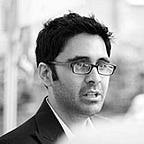The Heroes and Villains of American Collapse
Have We Become Readers of the Comic Book of Our Own Decline?
Here’s a tiny confession. I struggle on Twitter these days. Sometimes it amuses me — and sometimes, (it’s your turn to be amused), it frustrates me. I get no love, like the little puppy no one wanted. And having pondered the reason why, a thought struck me. Of course, it could just be because my disappointment is palpable, or I’m clumsy with words. But what if there’s another reason? One that says something about our inability to reckon with our own challenges in these troubled times?
Twitter, like so much of our pop culture, needs a comic book narrative. It goes like this. There’s an evil, horrible, irredeemable villain. There’s a noble, selfless hero — the underdog. The noble hero is fighting for all that is right and just. The evil villain, for all that is cruel and profane. Bang! Witness the spectacle — the clash of titans! Who will prevail? Whose side are you on?
You can see this tendency to comic book narrative in every aspect of culture now, if you care to look. We live in a time where people have probably watched more superhero movies than they’ve read books — and in which new superhero movies, shows, programs come out every month.
Now, there’s a school of (mostly leftist grad-school) thought that says: comic books are the great literature of our age! Forget Orwell and Kafka — in fact, they’re the great myths of now! Sorry, they’re not. I grew up on comics and I like comics and I still read them, sometimes, for fun, so I don’t mean “all comics, ever”. I just mean the attitude, idea, approach, of many, maybe most. What they’re not (vilify me if you must) is the literature or mythology of now (or maybe that we imagine they are is why we seem bewildered and paralyzed.)
Myths hold profound resonance and timeless meaning because they confront us with spectacular paradoxes about the great truths of a life — every life. The man of twists and turns, Odysseus, waylaid by fate. It’s true that he was a hero. But it’s also true that he wasn’t one in today’s puffed-up, caricatured form — he was a lost soul, in many ways, unsure, afraid, full of self-deceit. It’s also true that the villain he confronted wasn’t so simplistic, so obvious, so unrealistic…
